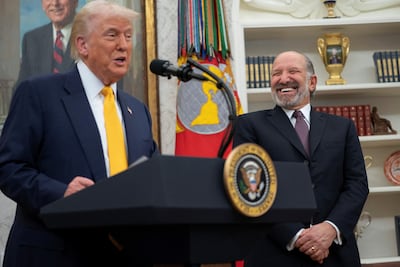Microsoft has urged US President Donald Trump to walk back restrictions on artificial intelligence chips enacted during the final days of Joe Biden's administration that placed limits on access to advanced chips and graphics processing units sought by countries including the UAE, India and Saudi Arabia.
Brad Smith, Microsoft's vice chairman and president, wrote in a blog post that the AI Diffusion Rule – which categorises countries into three tiers with regard to restrictions on access to US-made AI components – caps the export of critical materials to “many fast-growing and strategically vital markets”.
“Left unchanged, the Biden rule will give China a strategic advantage in spreading over time its own AI technology, echoing its rapid ascent in 5G telecoms a decade ago,” Mr Smith wrote.

In the lengthy blog post, Mr Smith said that Microsoft understood the desire to protect US national security interests, which is essentially the motive behind the AI chip export restrictions, but that Mr Biden's decision to place so many countries – among them Switzerland, Poland, Greece, Singapore, India, Indonesia, Israel, the UAE and Saudi Arabia – in the second tier, could have serious ramifications.
“This tier two status is undermining one of the essential requirements needed for a business to succeed – namely, confidence by our customers that they will be able to buy from us the AI computing capacity that they will need in the future,” he wrote. “Customers in tier two countries now worry that an insufficient supply of critical American AI technology will restrict their opportunities for economic growth.”
Australia, Belgium, Canada, Denmark, Finland, France, Germany, Ireland, Italy, Japan, the Netherlands, New Zealand, Norway, South Korea, Spain, Sweden, Taiwan and the UK are the countries exempt from AI diffusion restrictions, falling into what has become known as the first tier of AI diffusion countries. The third tier of countries, which includes China, Iran, North Korea, Russia, Syria and Venezuela, will have the most difficulty obtaining GPUs and CPUs under the new rules.

Nvidia has slammed the AI diffusion rule, describing it as “200-plus-page regulatory morass, drafted in secret and without proper legislative review”. A source at Nvidia later told The National that the new rules would make it harder for other countries, such as the UAE, to build capacity for “non-frontier AI use cases”.
Frontier AI is a term used to describe highly capable AI models and technologies that could pose severe risks to public safety. “This would capture a lot of GPUs that are included in gaming and other applications like health care and scientific research that don't have anything to do with frontier AI,” the source said.
During the final days of the Biden administration, several US officials sought to defend the AI chip export rules. Alan Estevez, the Biden administration's undersecretary of commerce for industry and security, said the new rules give tier two countries a path to obtain more chips if certain stipulations are followed, while also insisting the rules would prove effective in the long run as a way to blunt China's efforts to capitalise on US technology.

“AI can enhance military operations, command and control, targeting, logistics, autonomous warfare, all those things are very worrisome,” he said during an event at the Centre for Strategic and International Studies. The Information Technology and Innovation Foundation, a technology trade group based in Washington, said that the new rules will unfairly put pressure on nations to choose between the US and China, which could potentially backfire on the US and technology companies based there.
“The solution is not to further restrict access to AI chips or models but to reassess the current strategy,” wrote the foundation's vice president Daniel Castro. “Future policies should prioritise enhancing US competitiveness in AI by expanding market access for US chips and AI technologies to secure a dominant global market share for American firms, and countering geostrategic competitors like China and Russia, which are actively forming alliances such as the Brics AI Alliance to provide their partners with access to critical AI resources.”
Yet despite the nudging from some of the world's most powerful technology companies, it is not yet clear if the Trump administration will reverse the Biden policy, especially with the adversarial relationship between the US and China having become more contentious in recent months.

Ultimately, the decision might come down to Mr Trump's Commerce Secretary Howard Lutnick, who was recently at a meeting between Nvidia chief executive Jensen Huang and Mr Trump. Details of that meeting are scarce but the Nvidia source told The National that “strengthening US technology and AI leadership” were a major part of the conversation.
As for countries like the UAE, the US-UAE business council, an organisation dedicated to advancing bilateral commercial relations between the countries, recently encouraged members to submit comments to the Trump administration as it seeks guidance for an AI action plan.
A source familiar with the UAE's AI ambitions told The National that the US technology industry's criticism of the Biden chip export policy "speaks for itself".


